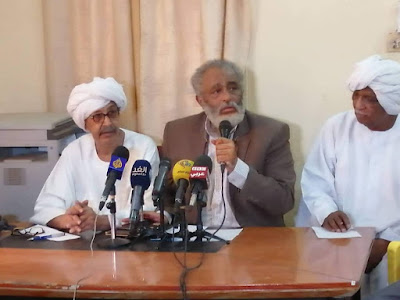Mada Masr, the leftist internet newssite, has some interesting background about the change of power in Sudan. Based on information from Sudanese military and opposition sources, plus Egyptian anonymous authorities, it reports about the fast demise of Awad Ibn Auf, the minister of Defence, and his deputy Kamal Abdel Marouf after they had taken over command from Sudan's leader for about 30 years, Omar al-Bashir. Also the head of the National Intelligence and Security Services,Salah Gosh, another figure closely tied to Bashir’s regime, resigned Saturday evening.
All three stepped down within 24 hours after Ibn Auf had taken power. And although the Defense minister did not indicate why he was stepping down, two military sources in Khartoum told Mada Masr that his removal was the result of broad disagreements within the senior ranks of the Armed Forces, that also led to direct confrontations between armed groups. Many changes and conspiracies emerged within the army in the past few days, according to Mada Masr, leading to clashes between the Armed Forces and security units, which have left large numbers of dead on both sides. Mada Masr's source source added that the conflicts were on several fronts: first divisions between the Islamist militias and the armed forces and second the junior officers in one camp and senior army officers in another.
 |
| Lt. gen. Burhan |
Burhan later on Saturday in his first national television adress announced several measures to “restructure and review” the political system, with an eye on stemming “corruption” and “favoritism.”First, he announced that all state governors who were appointed by Bashir after the emergency law was put in place will be replaced by military commanders in respective states. Second, he announced that a transitional military council would be formed “to represent the sovereignty of the state,” with the intention of forming a civilian government agreed upon by all within the two year transitional period.
The new leadership would hand over power within a few months to the civilian council formed by the Freedom and Change Coalition — an umbrella of opposition forces steered by the Sudanese Professionals Association — marking the start of a longer transitional period that will culminate in general elections.
After Burhan’s appointment on Friday night, however, the Sudanese Professionals Association continued to urge protesters to maintain their sit-ins in Khartoum and across the country, until power has been transferred to civilians, an indication that any talks broached between the new transitional military ruler and the opposition have yet to be finalized.
At a press conference on Saturday afternoon, representatives from the National Consensus Forces, the group of political parties opposed to Bashir’s party, announced the formation of a 10-person committee from the Freedom and Change Coalition that will meet with the transitional military council within hours to convey the opposition’s vision for a handover of power to a civilian government.





No comments:
Post a Comment